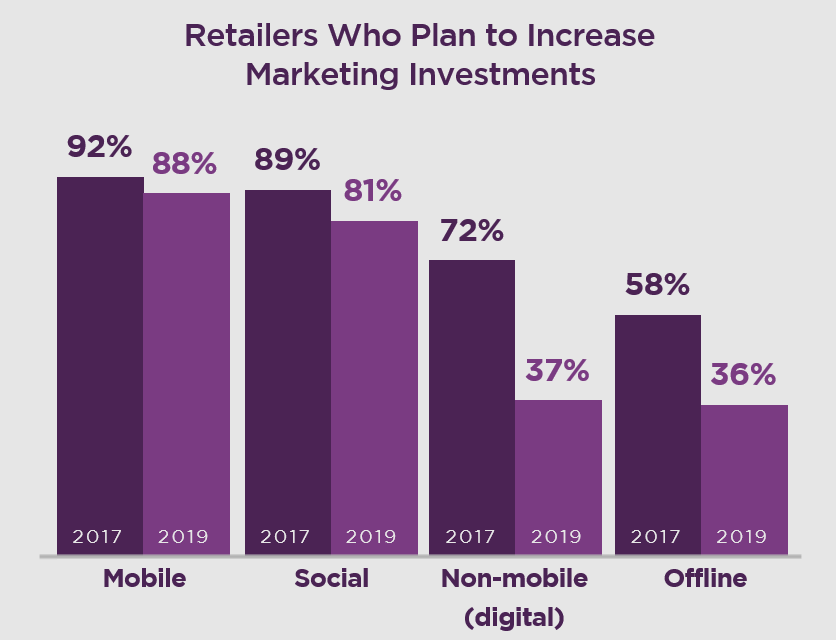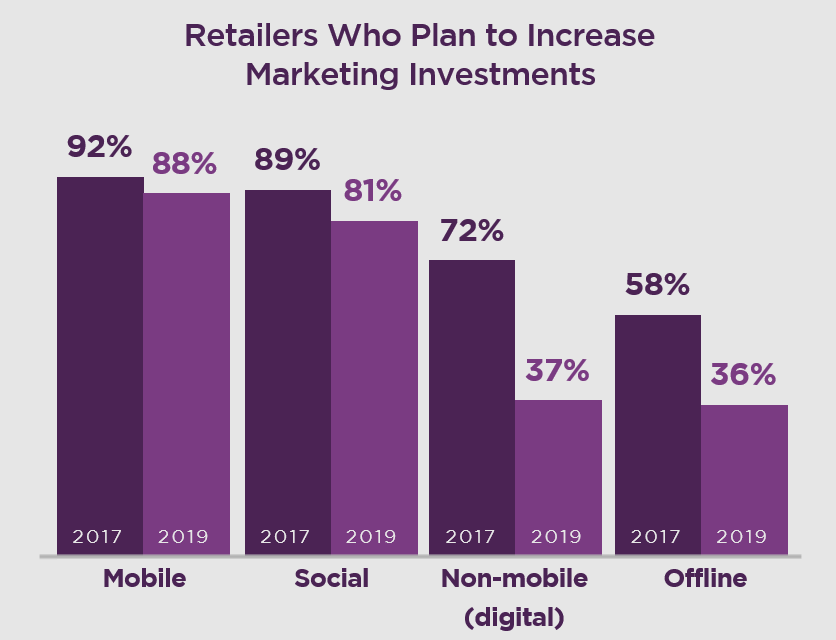Often brands do not listen to their customers, which can cause frustration and negative perception about the business. So, a new survey that considers both sides of the brand consumer relationship has got to be worth a look if your business is trying to sell to consumers.
Also: Millennials demand more social media engagement in exchange for loyalty
Austin, Texas-based promotional media company RetailMeNot has released its 2019 Retailer Playbook looking at trends this year. It asked 200 senior marketers at major retailers and over 5,000 consumers in November 2018 what they considered to be important this year.
It uncovered some interesting trends for 2019.
Consumer marketers are not interested in Gen Z just yet. Only five percent of brands will focus on Gen Z shoppers in 2019 — despite Gen Z’s use of social channels to connect with brands. Three out of five (60 percent) of retailers will focus their marketing efforts on Millennial shoppers instead.
Taking a stand is worth the risk for retailers. Almost nine out of 10 (87 percent) of retailers say taking a stand on social issues is worth the risk. Over four out of five (83 percent) say that failing to take a stand can negatively affect their bottom line.
This also extends into companies taking their role as corporate citizens more seriously. Three out of five (61 percent) of consumers say they would recommend a brand to their friends that aligns with their social values.
Offers and discounts top the list of growth strategies. Mobile app-exclusive codes and offers is the number one tactic that brands plan to use to positively affect sales growth in 2019. Marketers say that focusing on mobile marketing and smart promotions will win business for them.
Retailers will be bullish on voice shopping technologies. Although only 16 percent of Americans have made a purchase through a smart speaker, Almost all corporate respondents (96 percent) say that they are investing in this technology to allow consumers to shop for their brand on smart home speakers.
Almost three out of four (74 percent) of senior retail marketers believe shopping on smart home speakers will be a main form of shopping within three years.
Selection and free shipping drive Amazon purchases. Over three in five (63 percent) of shoppers say that they choose to shop on Amazon because they offer more free shipping compared to other brands. Two out of three consumers say that Amazon has a greater selection of products compared to other retailers.
Also: Target takes exclusive approach to expanding online store CNET
Try-before-you-Buy will replace BOPIS (Buy online, pickup in store). Half (50 percent) of brands say they have a budget dedicated specifically to developing these initiatives. Try-before-you-buy incentivizes more than one in three consumers (35 percent) to try new products they had not considered before.
Almost two out of three (63 percent) of retailers believe that Try-Before-You-Buy will be more popular than BOPIS options within two years.
Mobile is the biggest investment priority for retailers. Almost nine out of 10 (88 percent) of retailers plan to increase investments in mobile marketing. Eighty-eight percent, however, of non-mobile (digital) and offline marketing increases are significantly lower than they were two years ago.
 RetailMeNot
RetailMeNotSubscription services are growing among consumers looking for lower costs. Currently 16 percent of consumers are buying items through subscription services, and average consumer purchases through three subscriptions. One out of three (34 percent) say they will use a subscription service in the future.
Millennials are slow to make purchases on social media. Only one in three millennial shoppers have made a purchase via a social media advertisement. Fewer than three in 10 (29 percent) have purchased directly through an influencer’s link on social channels. However, two out of five millennials would consider making a purchase via these channels in the future.
Automation of savings provides more time and boosts confidence. Almost three out of four (72 percent) of brands believe that the number one benefit to a browser extension that automatically finds and adds deals to consumer shopping carts is that it will save customers time.
Consumers think this technology will give them confidence that they found the best deal (63 percent), and make online shopping more enjoyable (62 percent).
Also: These 8 e-commerce giants are redefining retail TechRepublic
Marissa Tarleton, CEO, RetailMeNot, said: “Retail marketers are beginning to lay significant groundwork and investments on emerging technology, like voice shopping, which we anticipate to take off in the next two years.”
It is obvious that the retail sector is poised for major change and continued success. Try-before-you-buy and voice shopping are efficient ways for the consumer to get what they want with little effort on their part.
Marketers need to shift perspectives to capture audiences and continue to raise the shopping experience for their consumers to stick around.
Previous and related coverage:
Gen Z uses channels to start social relationships with retailers
Generation Z works to be a part of their favorite brands — using their channels as a way to start social relationships with retailers.
Betrayal by CGI: Almost half of Gen Y and Z don’t know they’re following a bot
What if the influencer you had been following on Instagram — whose choices you admired, and whose social causes that you believed in — turned out to be a robot?
Almost all Americans are frustrated with voice channels to talk to companies
If an AI system works really well, do we prefer it or want to talk to a live agent?

